Hiring managers will always be trying to learn more about job applicants during the hiring process. However, while an applicant’s qualifications are exhaustively articulated through a resume, information about a person’s character and work ethics remains unexploited. This is where a character reference letter comes in; to shed more light on an applicant’s character from a third party’s perspective.
Unlike a letter of recommendation, which a former employer or professional acquaintance typically writes, a character reference is written by someone who knows the applicant personally enough to vouch for them. Therefore, it can be written by: friends, family members, neighbors, colleagues, mentors, or coaches.
But, What is it Actually?
A character reference letter is a reference letter that highlights a person’s positive characteristics and how they are helpful at the workplace. It is written by people who know the recommended individual personally and is meant to persuade the employer or recruiting manager/committee that the particular candidate is suitable for a job position based on individual characteristics. It is sent in accompaniment to the resume or CV and other documents during the job application process.
Other names used to refer to a character reference letter are:
- A personal reference letter
- A letter of recommendation
Free Templates
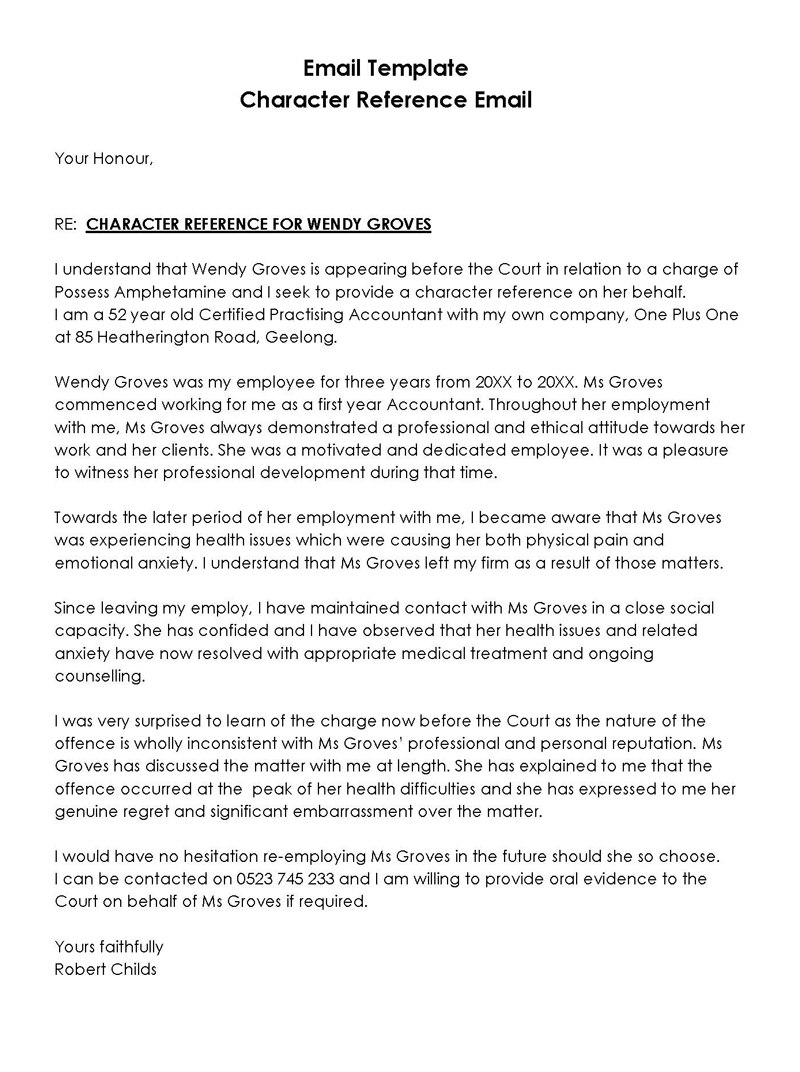
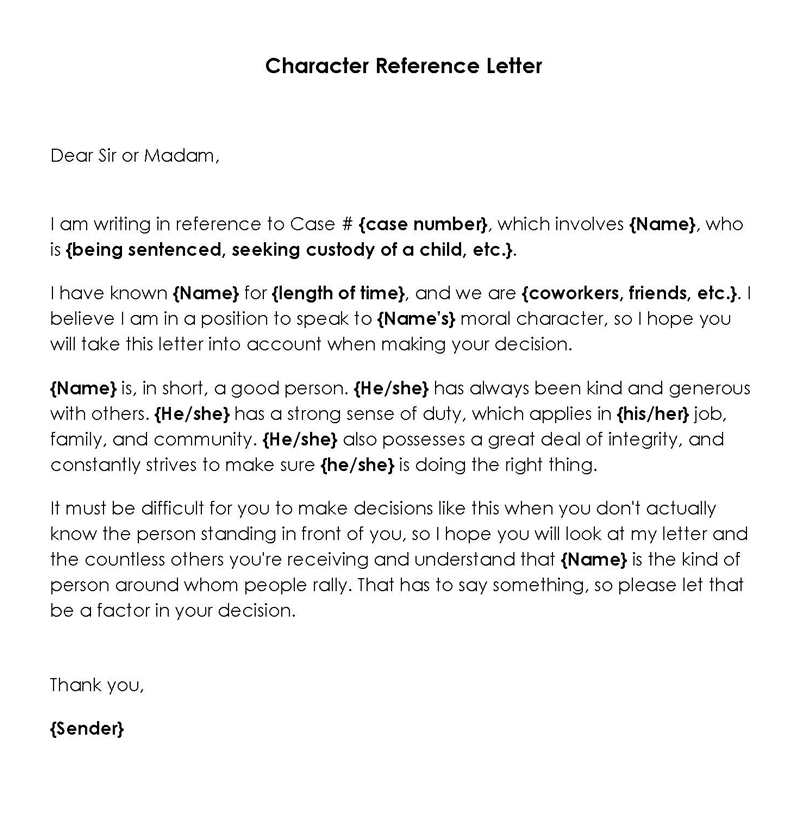
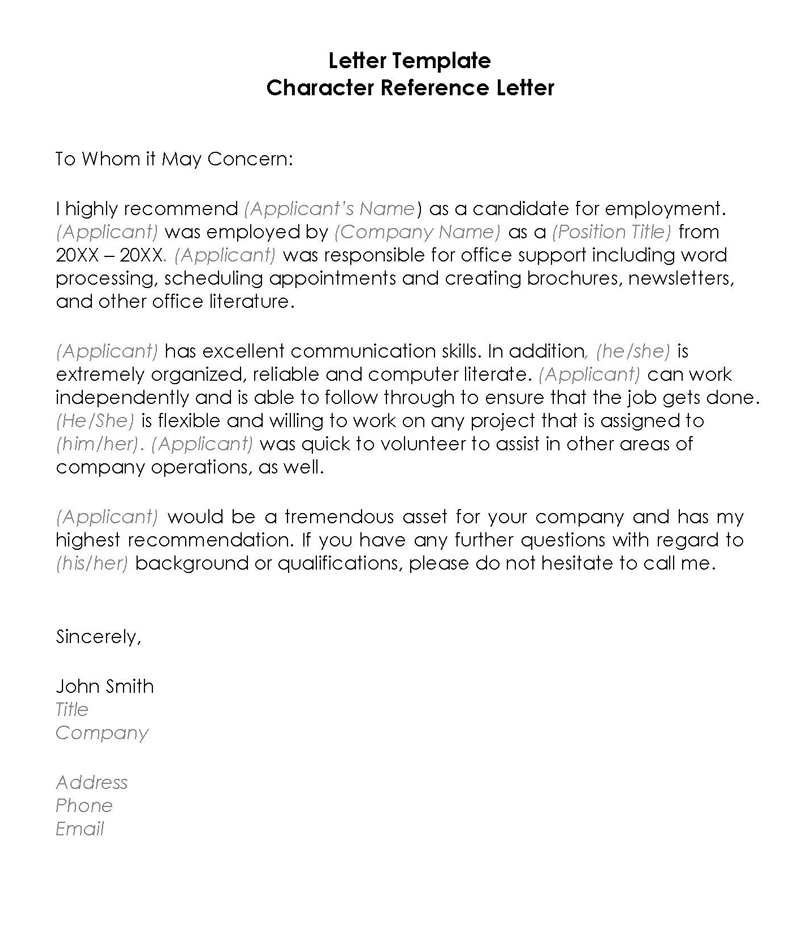
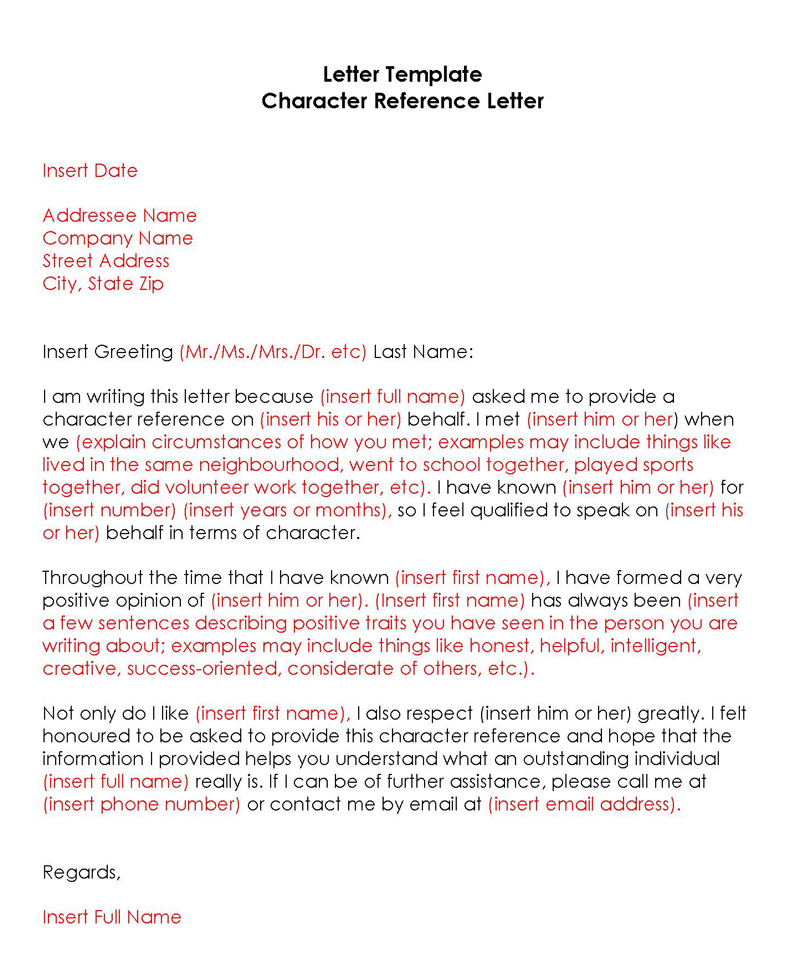
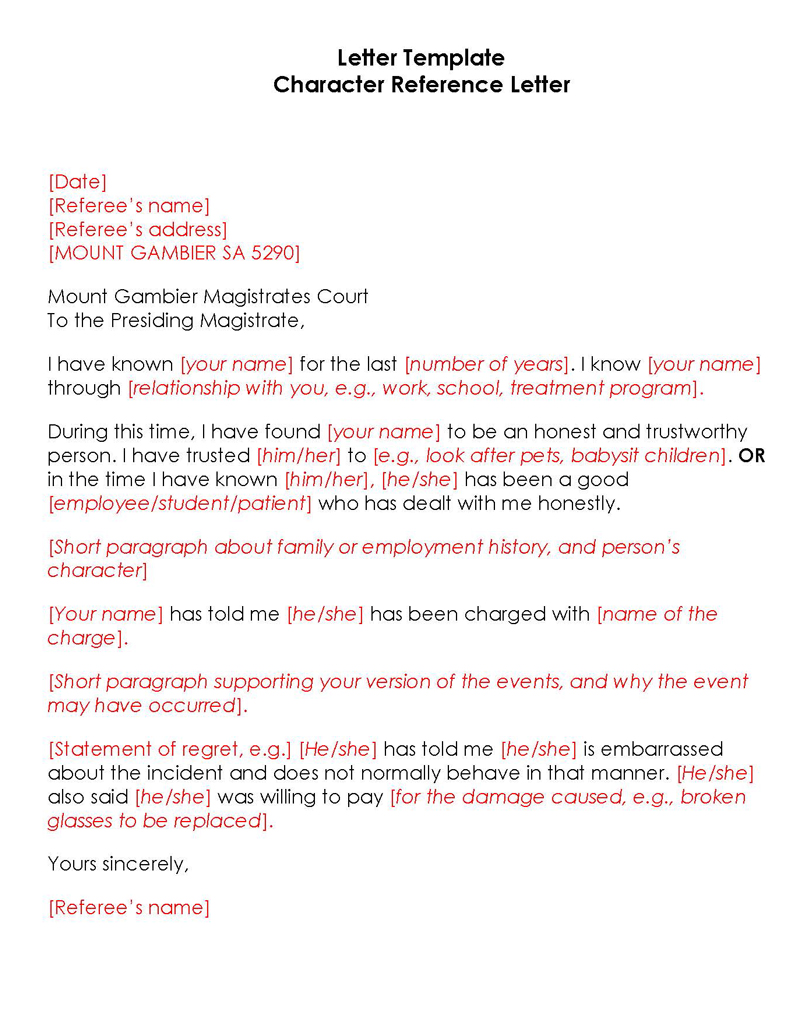
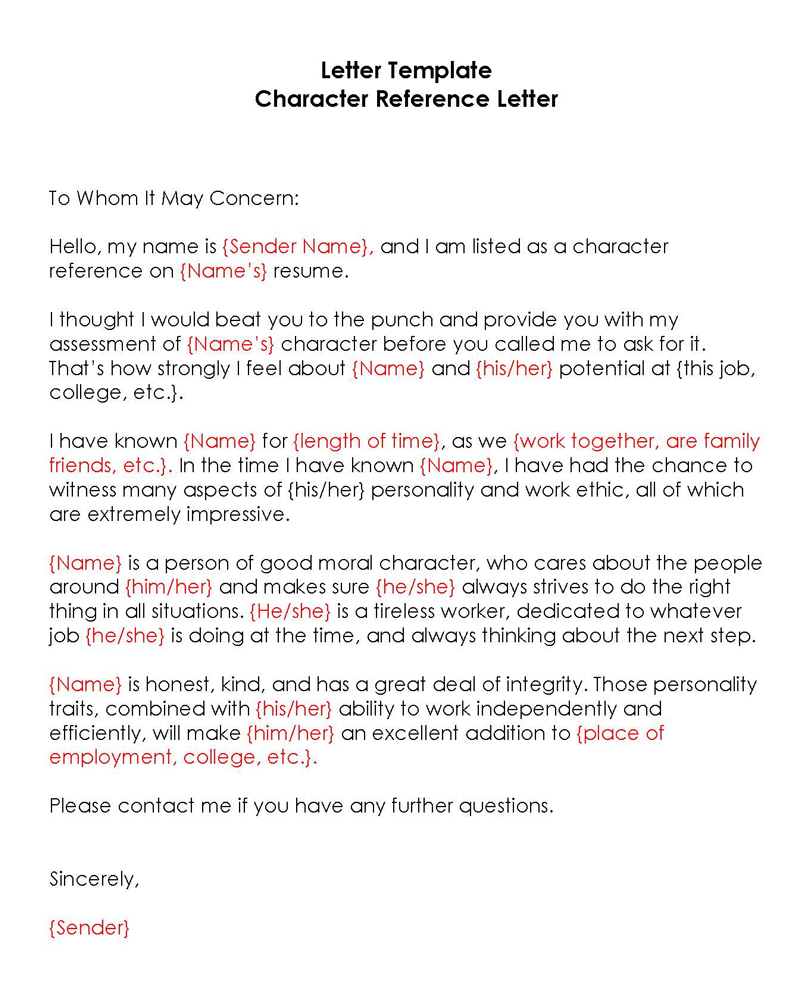
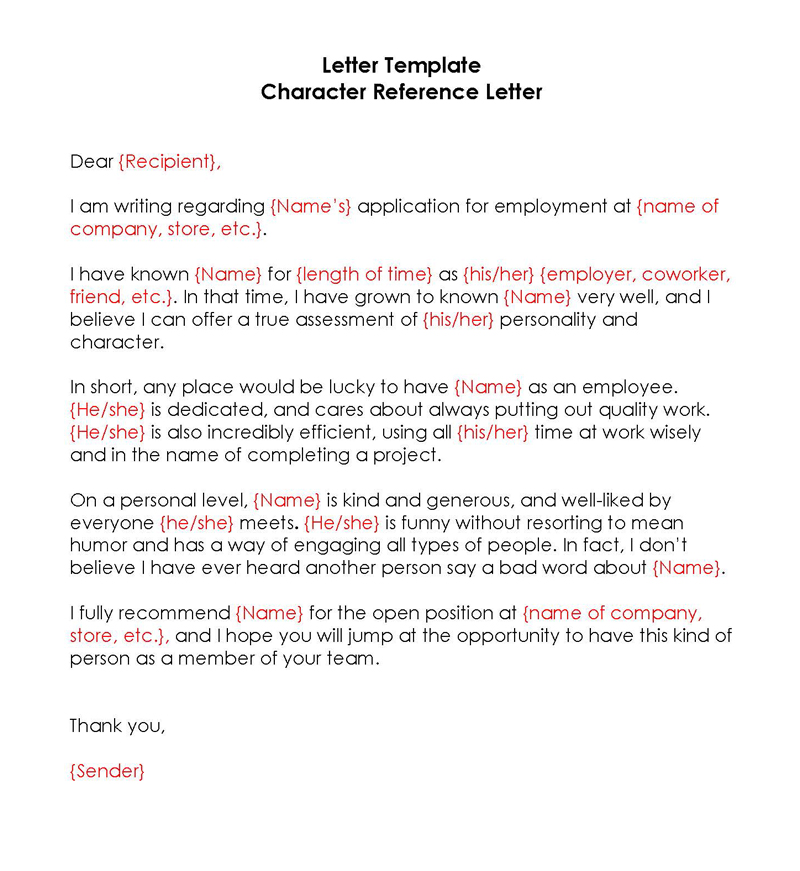
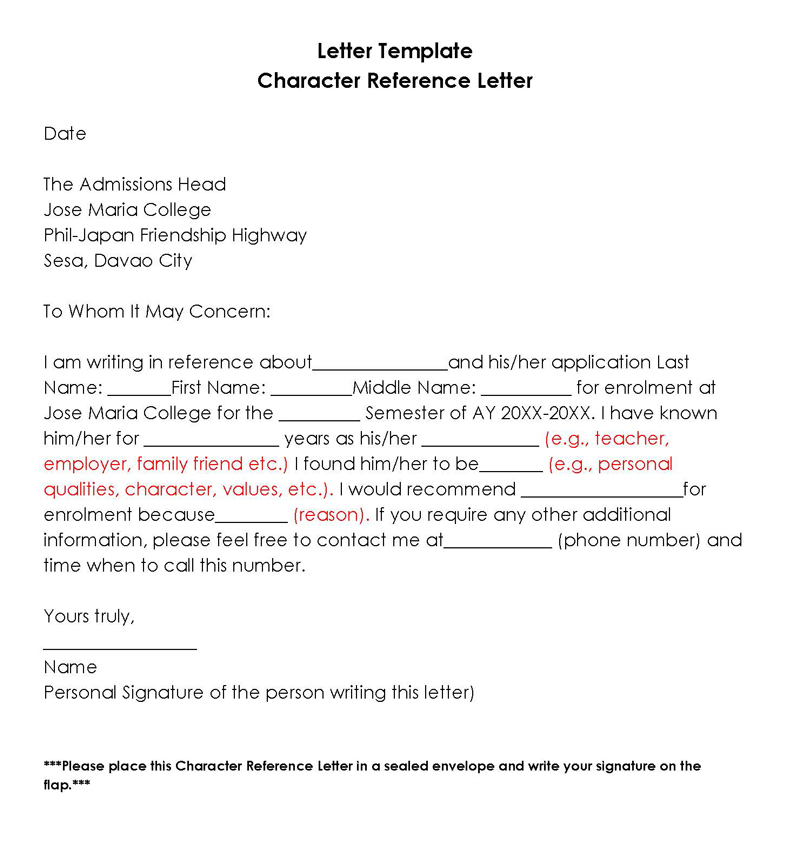
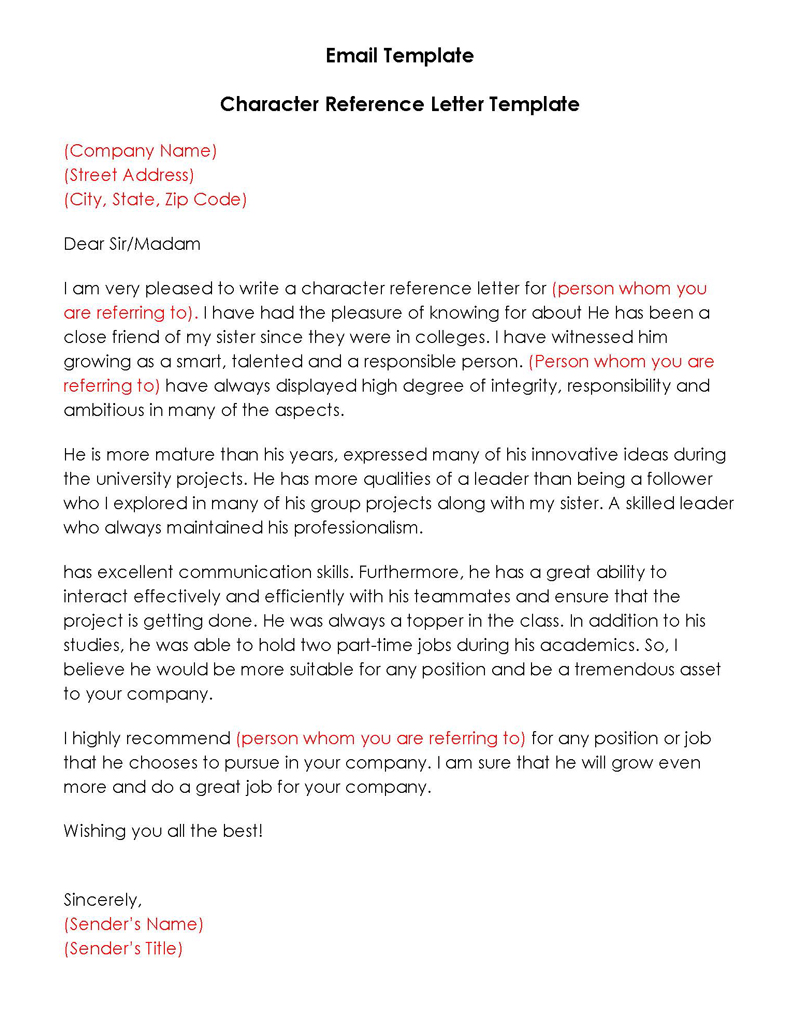
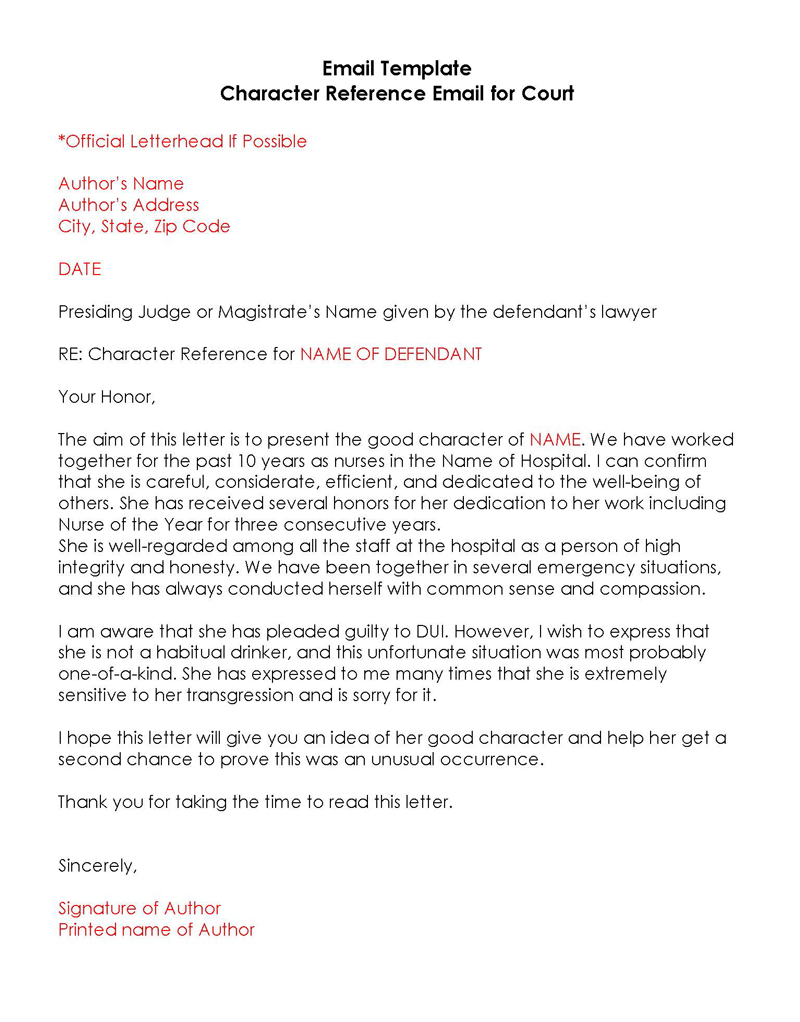
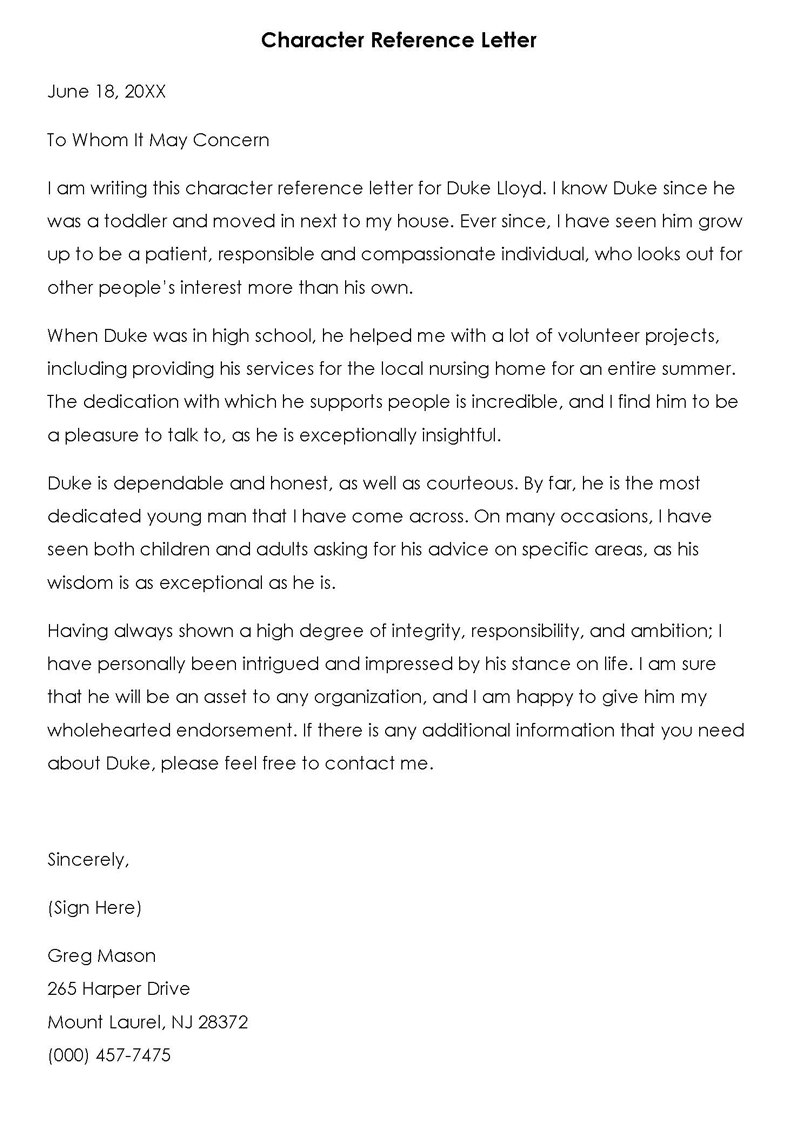
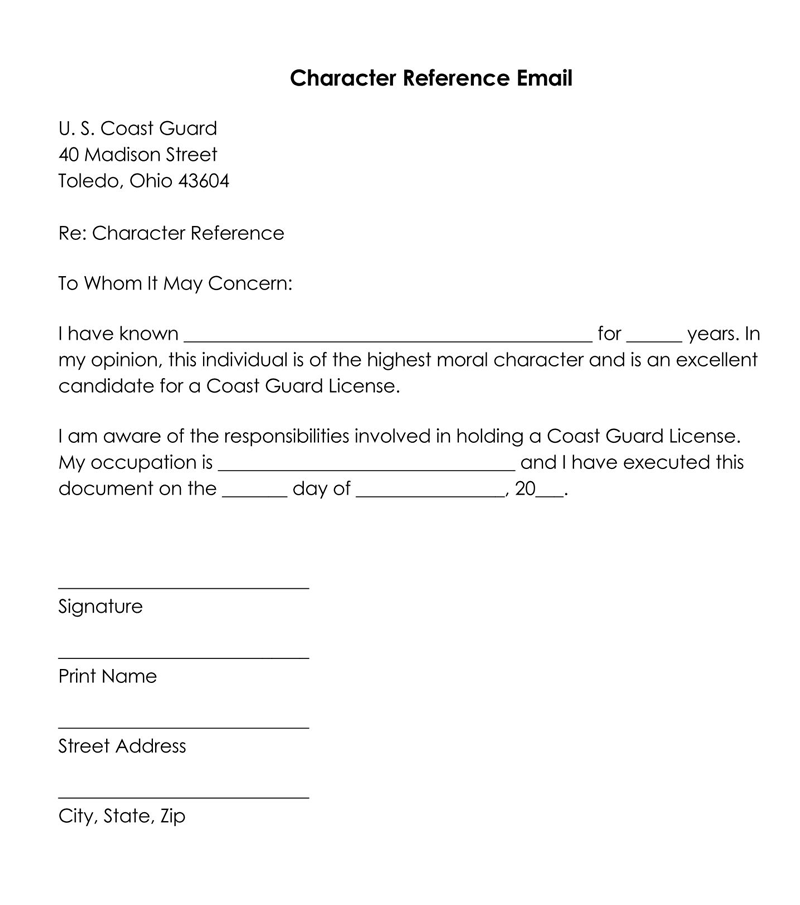
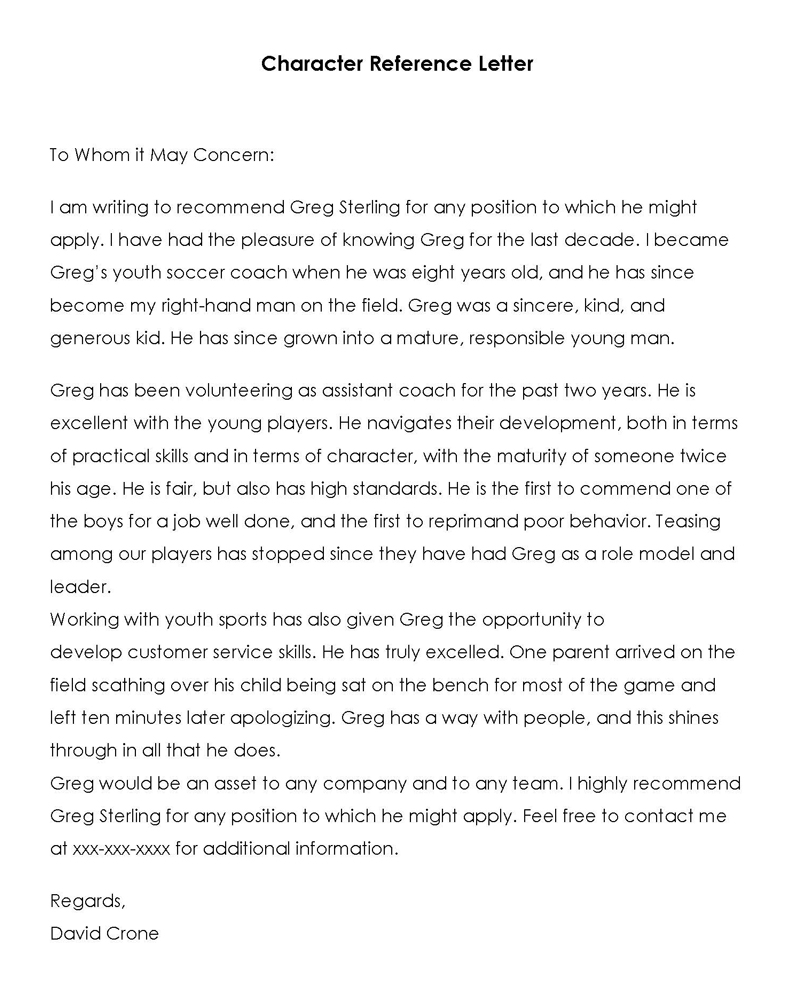
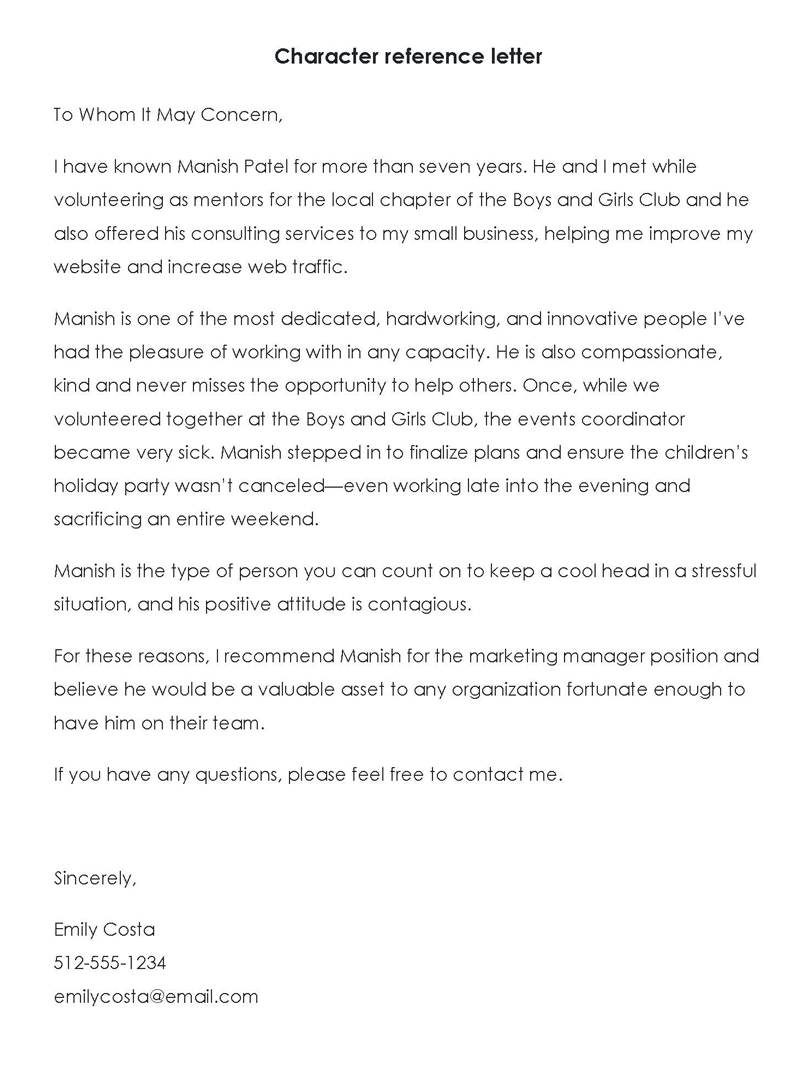
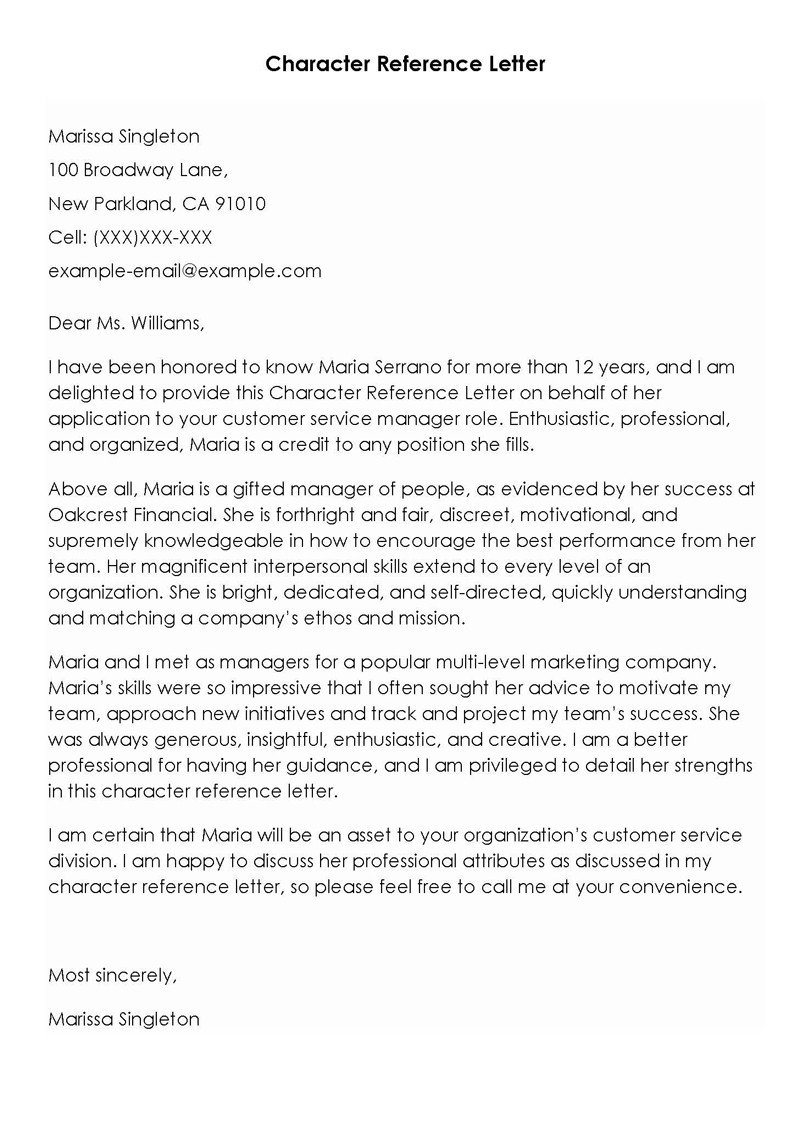
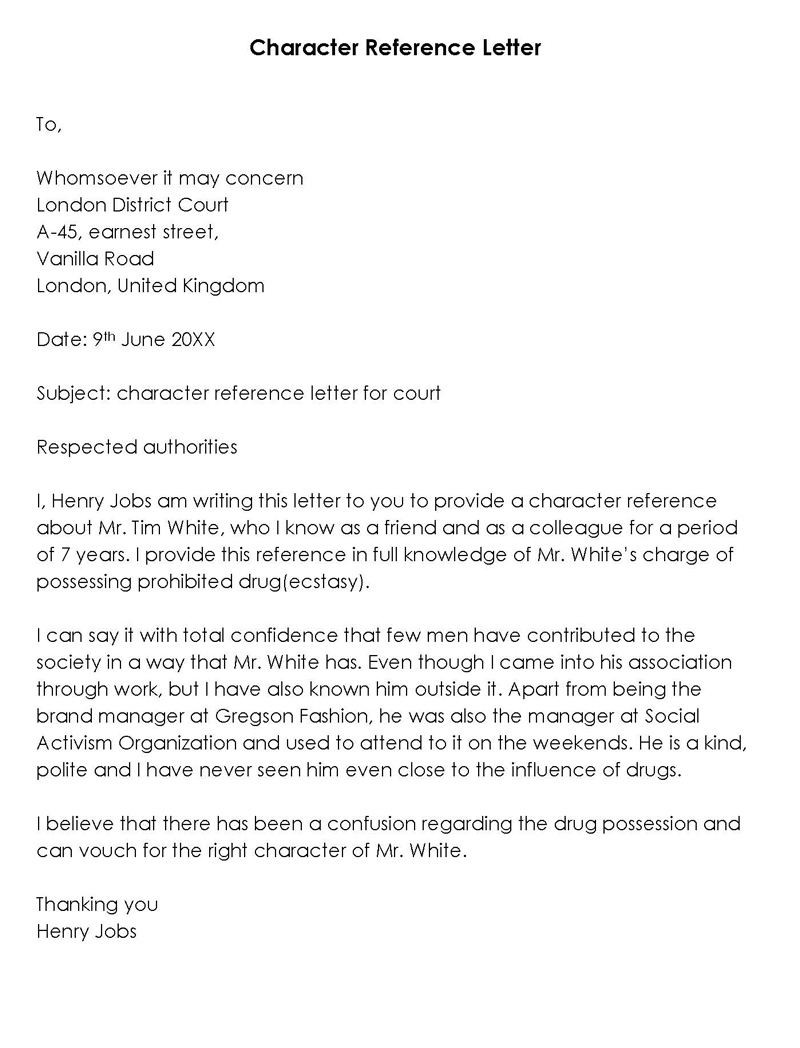
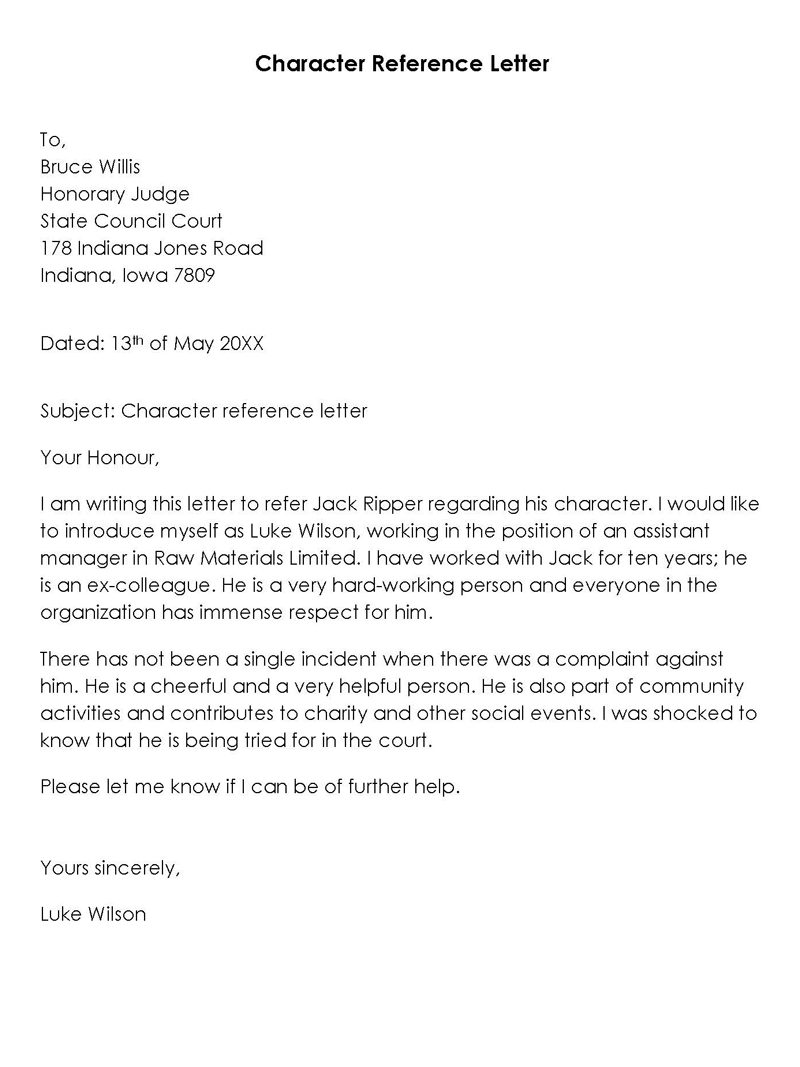
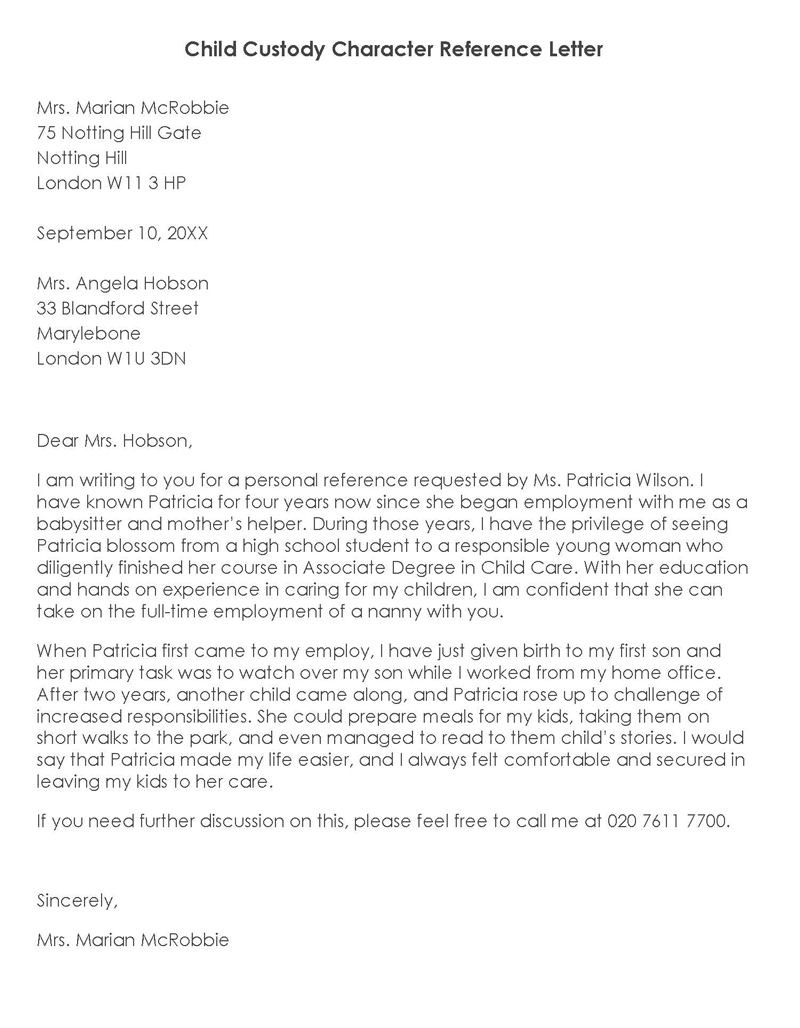
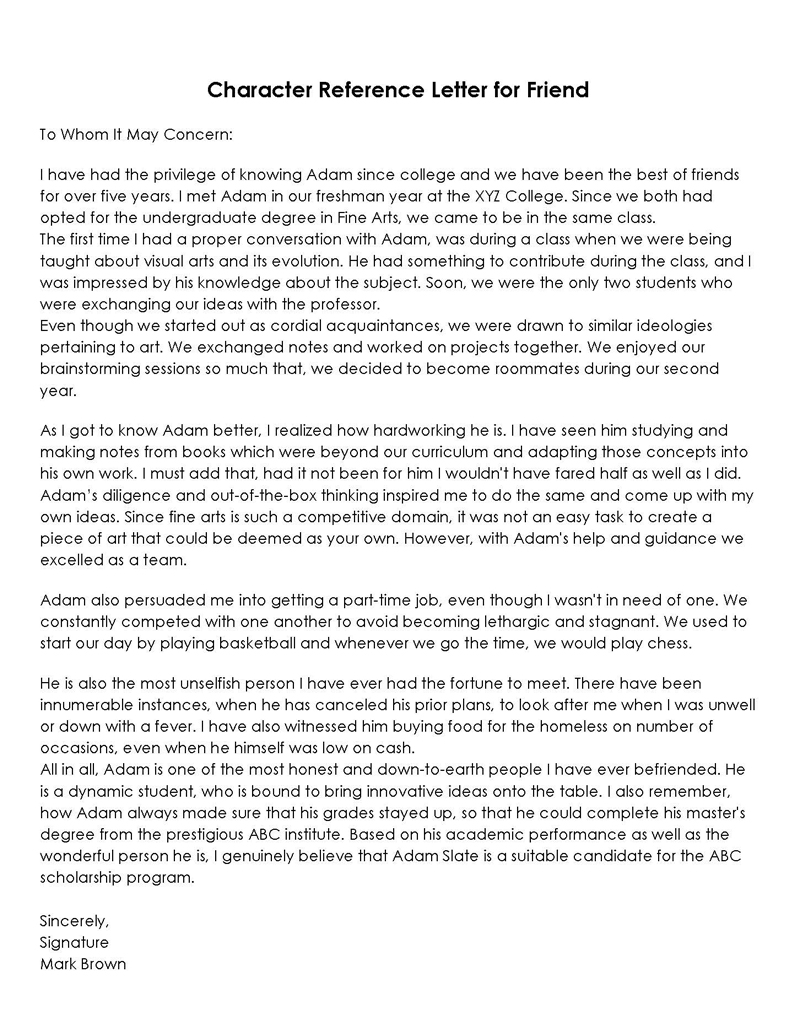
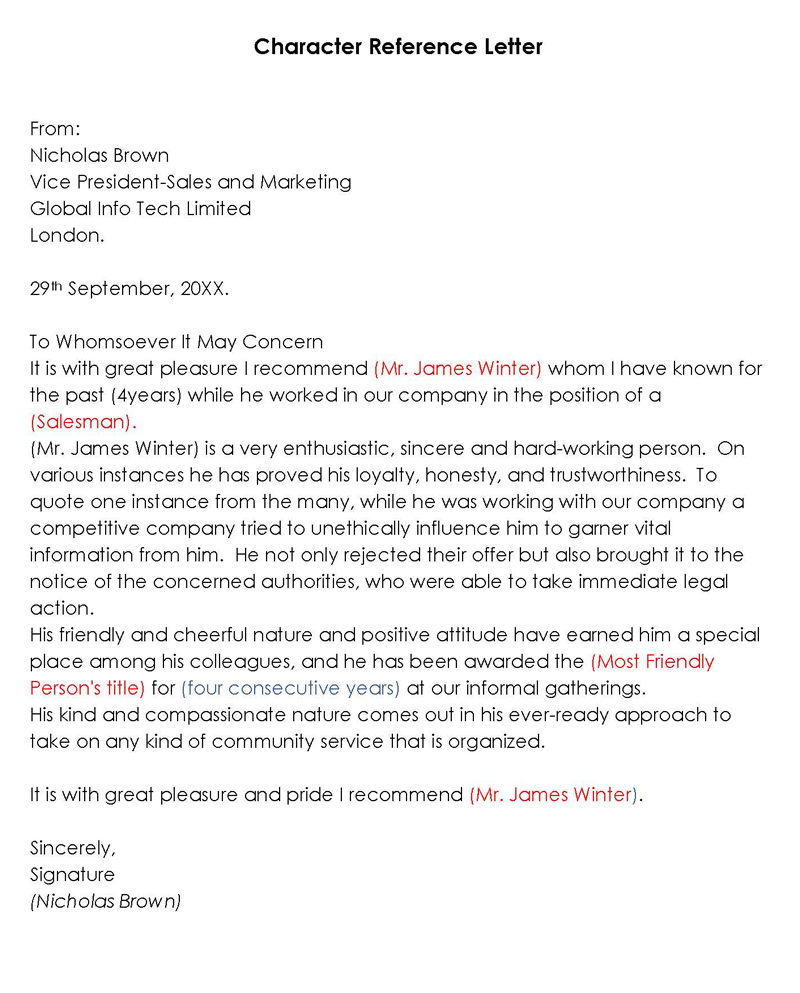
When May You Need it?
A character reference letter is used when applying for a job to strengthen an application. The letter is, however, not mandatory. In some cases, managers can request one, and in other cases, the applicant can take the initiative and send the letter. Typical situations where a character reference letter without being a requirement is when the applicant has little or no job experience for the position they are applying for. The letter can also be prepared when the professional references are not satisfactorily strong.
Character reference letters may be required when applying for certain jobs that deal with a specific set of people where the character is a significant consideration for the hiring manager. Examples of such jobs include nurse, babysitting, elementary teacher, elderly home workers, etc.
If You are a Requester:
Anyone asking for a character reference letter will generally be applying for a job opening. The letter can play a significant role in securing the job. Therefore, some considerations must be considered when asking someone else to write a personal reference letter for them.
Who and how to ask for the letter?
Begin by asking yourself who is best suited to recommend you? And how to request them to write the letter. There are usually a lot of people who know you well to recommend you for a position. However, not everyone you know on a personal level is a suitable referee.
Wisely choose whom you’ll request for the letter: Always select someone who can positively vouch for you to the hiring manager. Family members should not be the go-to option as their recommendations will usually seem biased with justification. Instead, a coach, supervisor, or neighbor with whom you have had positive run-ins can make good referees.
Provide your details for their ease: Ensure you give the recommender enough details about yourself and the position you are applying for. For example, ensure they have your official name, name of the company you’re applying to, position, submission deadline, job description, and any other relevant information.
Do not impose to write: If the person you asked to write declines, do not pressure them to write one. Let them know it is a request, not a command. If the recommender writes the letter unwillingly, this may result in a poorly written and weak character reference letter, negatively impacting your application.
Thank them for their favor: Once the letter is submitted to the company, thank the referee for putting in the effort and time to write and send the letter. Thank them in person or through a thank you letter.
When to ask?
Ask for a character reference letter any time you are required to submit one. Employers, professional organizations, government agencies, universities, scholarships, and volunteer programs can request character reference letters. Also, personal reference letters are commonly sent for entry-level job applications even if they are not a requirement.
If You are a Writer
Now, what should you do when a friend or a student from your hockey team has approached you to write a personal reference letter on their behalf?
There are two things you should consider in such a situation:
When to write a letter?
The first thing is to know when to accept or decline the request. A personal reference letter plays a significant role in persuading a hiring manager that the applicant is suitable for the vacancy. You, therefore, must prepare a strong reference letter that can persuade. If you feel you can do this, you can accept the request, write the letter, and send it to the correct address. However, if you feel you cannot craft a strong reference letter, politely decline the request, and give a reason.
Request information
If your answer is “yes,” ask the applicant to provide you with all the necessary information that needs to go into the letter. Make sure you understand the letter’s purpose, company details, submission method, and due date. Also, ask for their resume; there might be one or two skills or experiences you can reference in the letter.
Steps to Write a Character Reference Letter
The process of writing a personal or character reference letter is relatively straightforward. The letter ought to have three main parts; an introduction, body, and conclusion.
Below is a step-by-step guide on how to write an effective character reference letter:
Introduction
The introduction should state who is the author of the letter and the recipient. This is meant to make sure the letter gets to the right person and lets the reader know who wrote the letter.
- Address the reader graciously: A formal salutation should be given addressing the reader by their name and official title, say Mr, Mrs, Ms, or Dr.
Body
After the salutation, proceed to the body of the letter. In this section, you are expected to vouch for the applicant by using specific information exhaustively. The following information should be input in this section.
- Specify your relationship: Introduce yourself by stating what you do and how you know the applicant, and then introduce the specific candidate you are recommending. Companies usually receive multiple applications; hence the need to specify the applicant is necessary.
- Specify the time since you know the applicant: Clarify the nature of the relationship by stating how long you have known them and, if applicable, how you met. You can give a background to your relationship in a few sentences.
- Describe the qualities of the applicant: Next, highlight the different positive traits of the applicant. Ensure to focus on qualities that align with the job description and company values. This act may require some research on the company and can prove essential in persuading the hiring committee that the applicant is suited for its ethics and culture. Some of the qualities to consider are ambition, resilience, courage, creativity, compassion, etc.
- Support your words with concrete examples: It would be best to give specific examples of situations where the applicant exhibited the mentioned qualities. Using real-life examples increases the applicant’s value to the company. Note that skills are better demonstrated than mentioned, and this is the perfect place to illustrate the applicant’s skills such as leadership, organization, communication, social skills, etc.
Conclusion
The last part of the letter is the conclusion. The conclusion can be formatted as discussed below.
- Conclude by strongly referring to the applicant: Conclude the letter using a strong closing point that reaffirms your stance on recommending the applicant in question. You can also thank the reader for reviewing the letter.
- Write your name and contact information: Lastly, insert a complimentary close and provide contact information to reach you if they have questions regarding the recommendation. You can include a phone or an email address. Name and contact information are provided at this point for email character reference letters; mail letters will have this information in the header and must be signed.
Character Reference Letter Template
Dear Mr/Ms/Mrs [Name of the hiring manager/recipient]
I am [your name] a [job title]. I’m a [relationship with applicant] to [applicant’s name]. With great joy, I’m recommending [applicant’s name] for the [opening]. We have been friends for approximately 15 years now, and I have enjoyed his compassion as a trustworthy friend.
For the time I’ve known [name], he has been a time-conscious person, passionate [qualities] about his work, and is an excellent orator. He is also social and polite and offers a helping hand to others whenever he can. He is known to use these skills when making sales pitches, and he’s proven to be very convincing to clients.
I first met [name] in senior high school at a physics lab. I struggled to locate different instruments required for a practical exam we were taking, and [name] came to my rescue. He was kind to help me find everything I needed, and I’ve always been grateful for that moment, knowing it formed a bond that has been fruitful throughout the years.
[name] is very reliable and result-driven. He can be trusted with submitting sales reports on time. I highly recommend [name], and it is my hope you will consider him for the position.
Thank you.
Sincerely,
[name]
[phone number]
Character Reference Letter Sample
Dear Mr. John Doe,
I’m Clark Kent, an HR manager at Air fix technologies and a friend of Martin Tyler. I’ve written this character reference letter to endorse John for the Chief Security Officer position. We have been neighbors and more so friends for ten years now. I’ve known John to be an honest, competent, attentive, and confident person throughout the years.
He has demonstrated his capabilities in the security sector in his previous jobs, and this job would be a new challenge and an opportunity for him to grow. In addition, he is known to be actively involved in community activities. For example, he is an active member of our Homeowner’s Association, where he is in charge of the neighborhood watch.
Late last year, my house was invaded by looters, and John was the first responder to my house as soon as the alarm went off. He was brave to answer a call for help without knowing what to expect. As your chief security officer, I believe he will replicate the same and more, offering excellent security services for your company.
I am confident John is the best person for the job, and I sincerely hope you will consider allowing him to work for you.
Thank you.
Yours sincerely,
Clark Kent
5555-2839
ckent@email.com
Professional Tips for You
Below are techniques you can use to write a powerful personal reference letter:
Keep the letter short
Aim to keep the letter as brief as possible. Hiring managers will often have to quickly review the letter because there are usually multiple applications to review. Therefore, the letter should be at least one page long. Being specific and direct to the point is one way of ensuring the letter is brief.
Do not write personal information
Avoid including intimate matters such as personal struggles in a character reference letter. The letter should be respectful of the applicant’s privacy.
Give examples of his good qualities
Always use examples to expound on a person’s qualities in a personal reference letter. Then, paint a picture of how the applicant demonstrates the mentioned traits in real life by citing specific experiences and your interactions with them.
Write only positive things
Keep the reference letter positive. The objective is to help the applicant secure the position they are applying for. Therefore, showing the hiring manager the optimistic view of the applicant can persuade them to see the applicant in the same light.
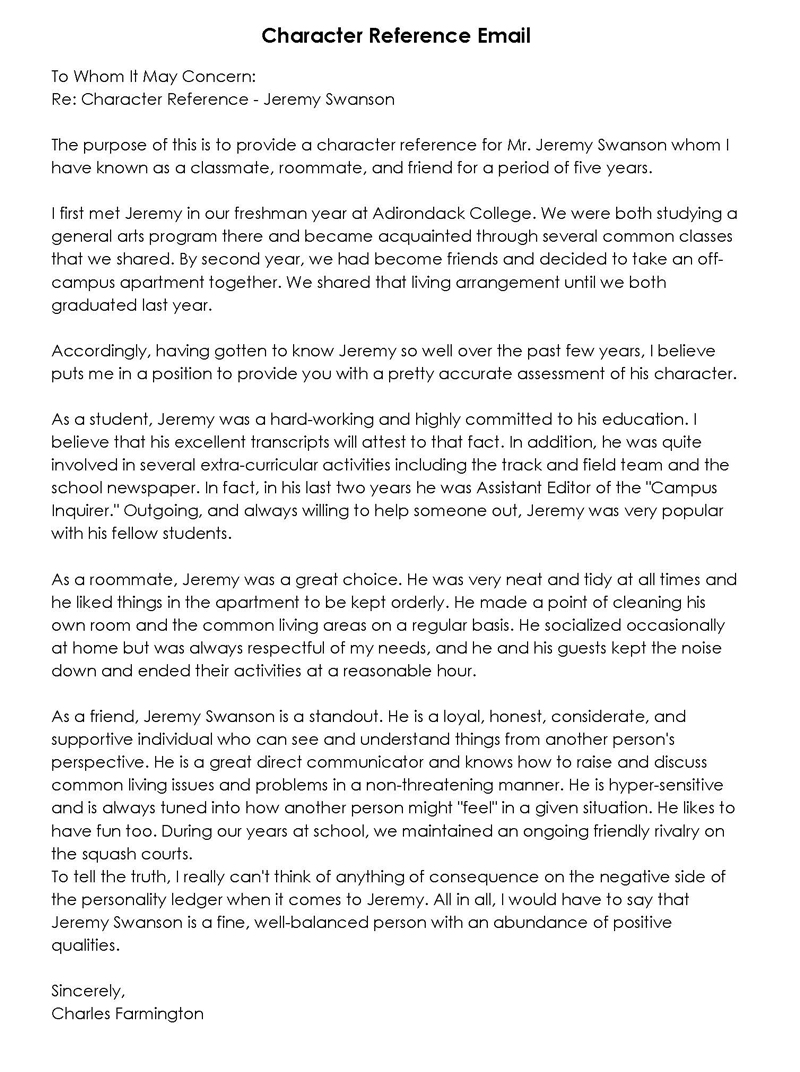
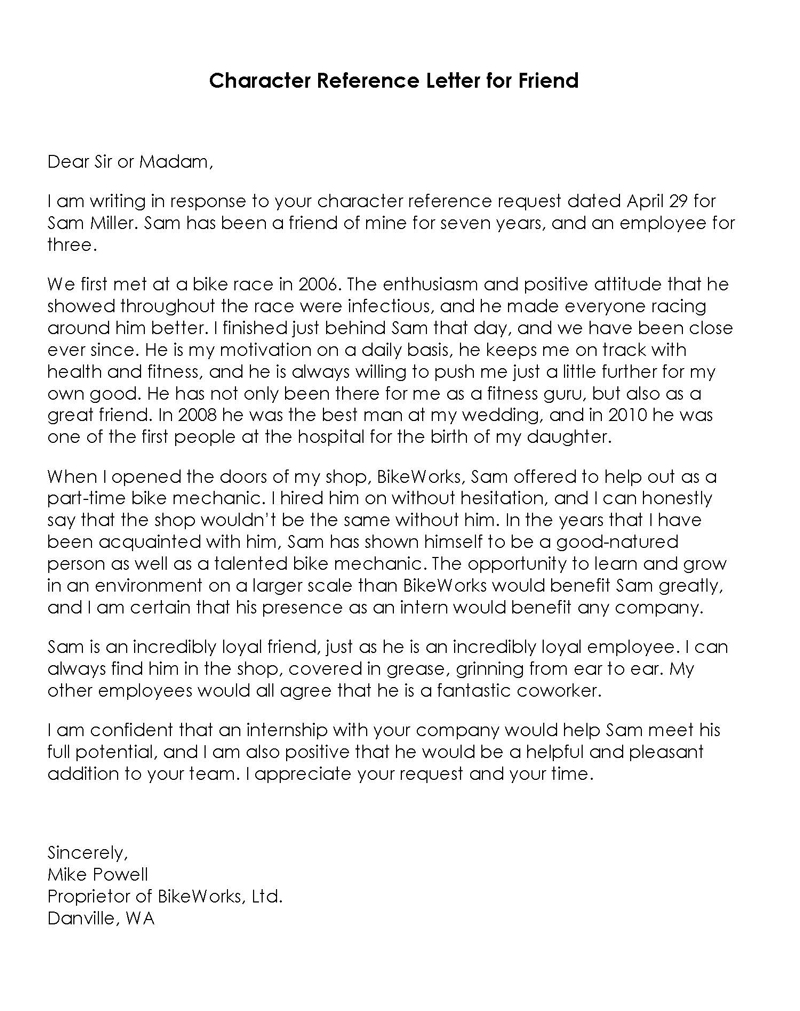
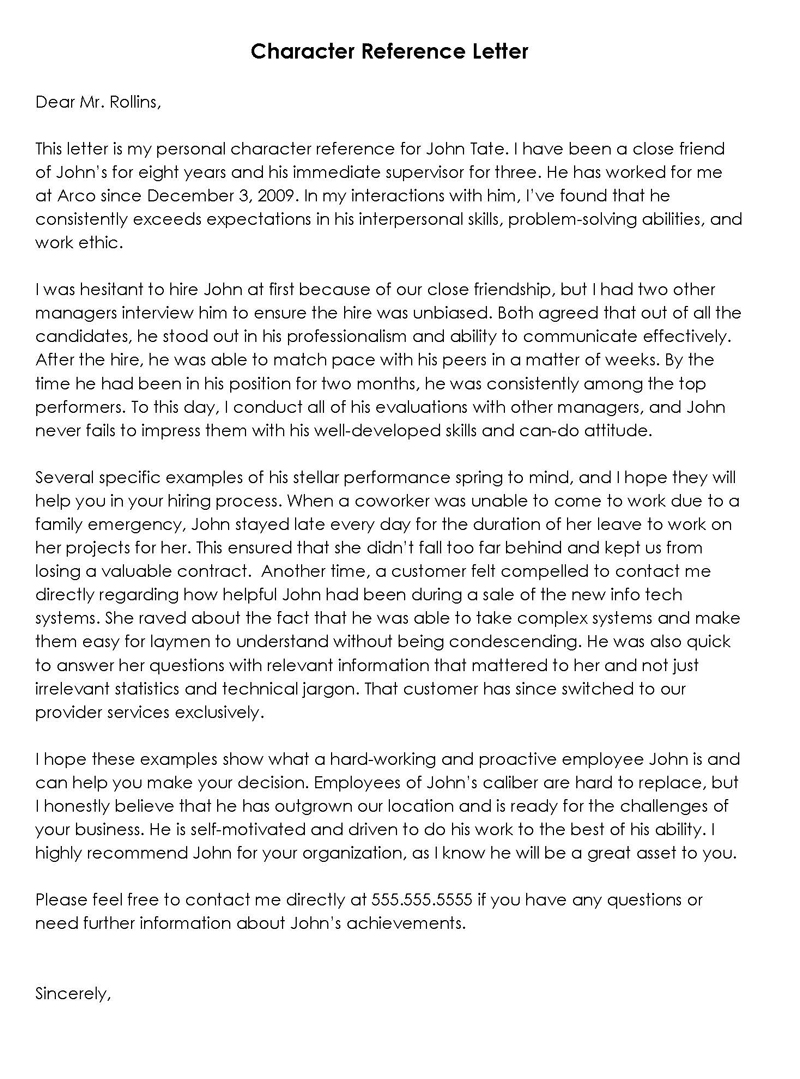
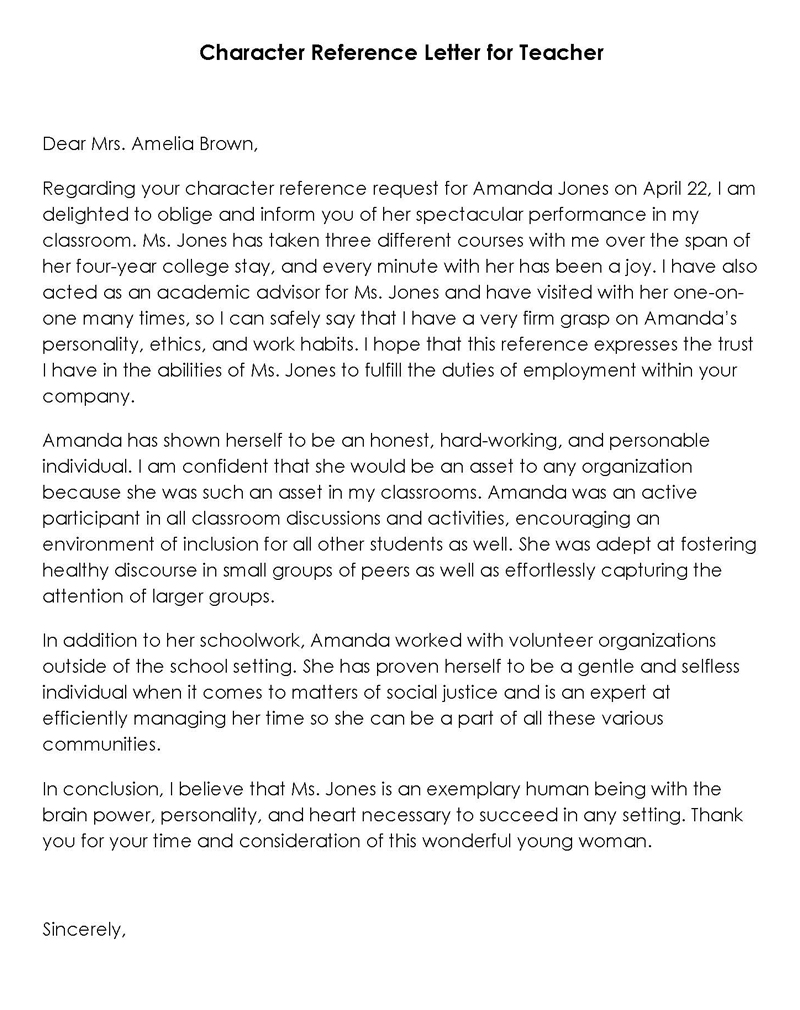
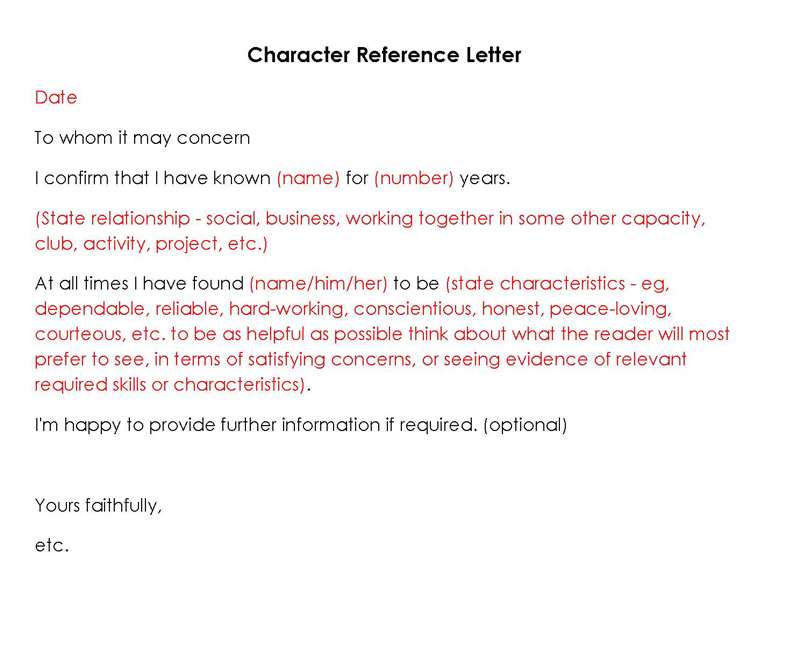
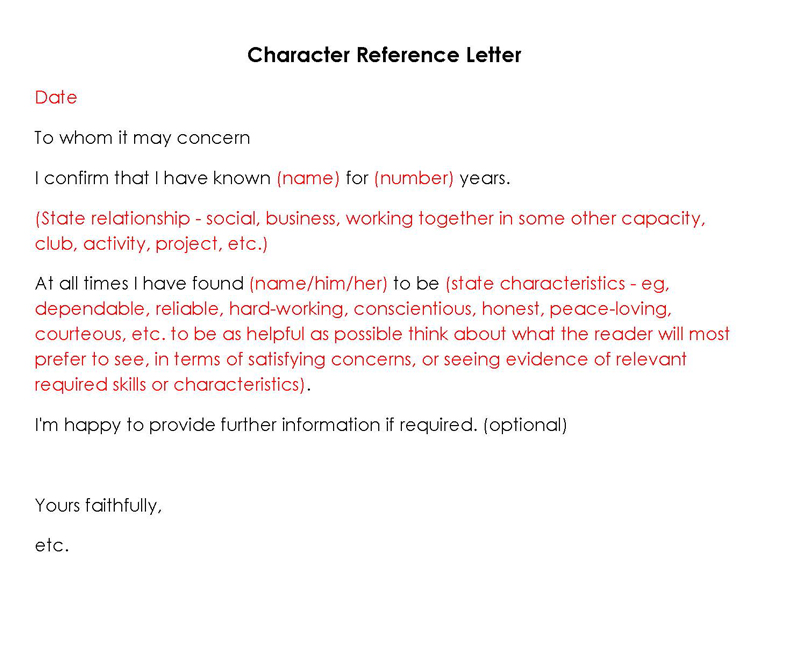
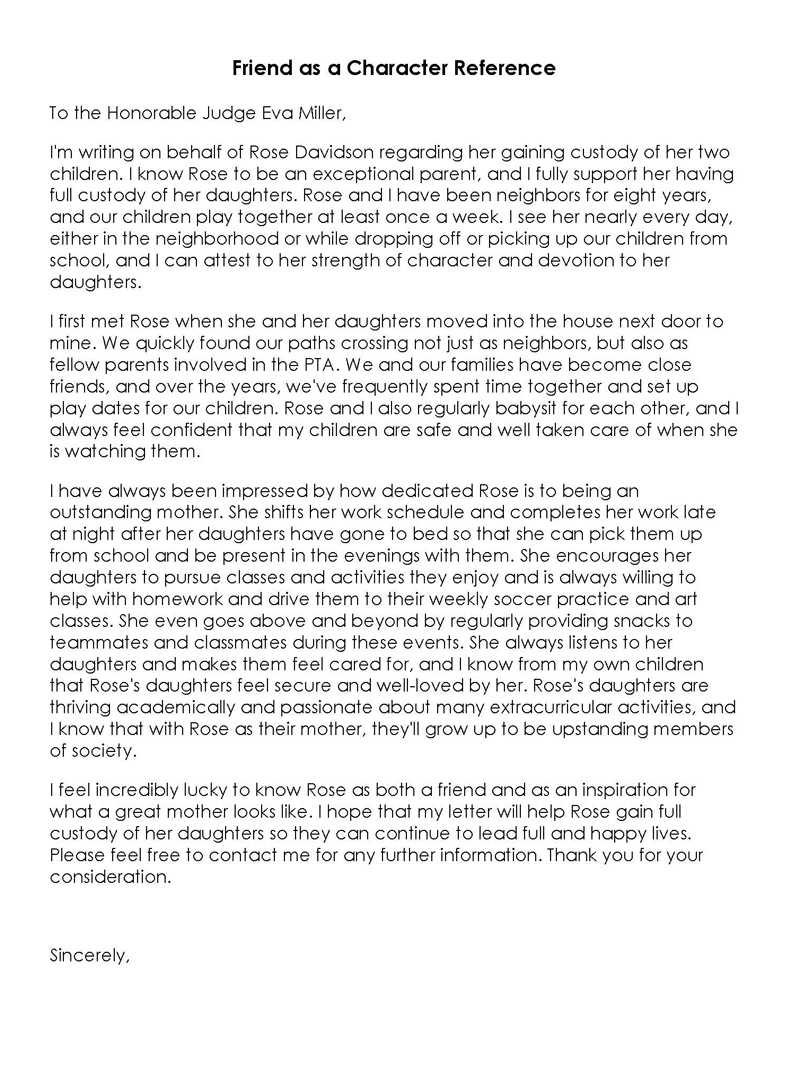
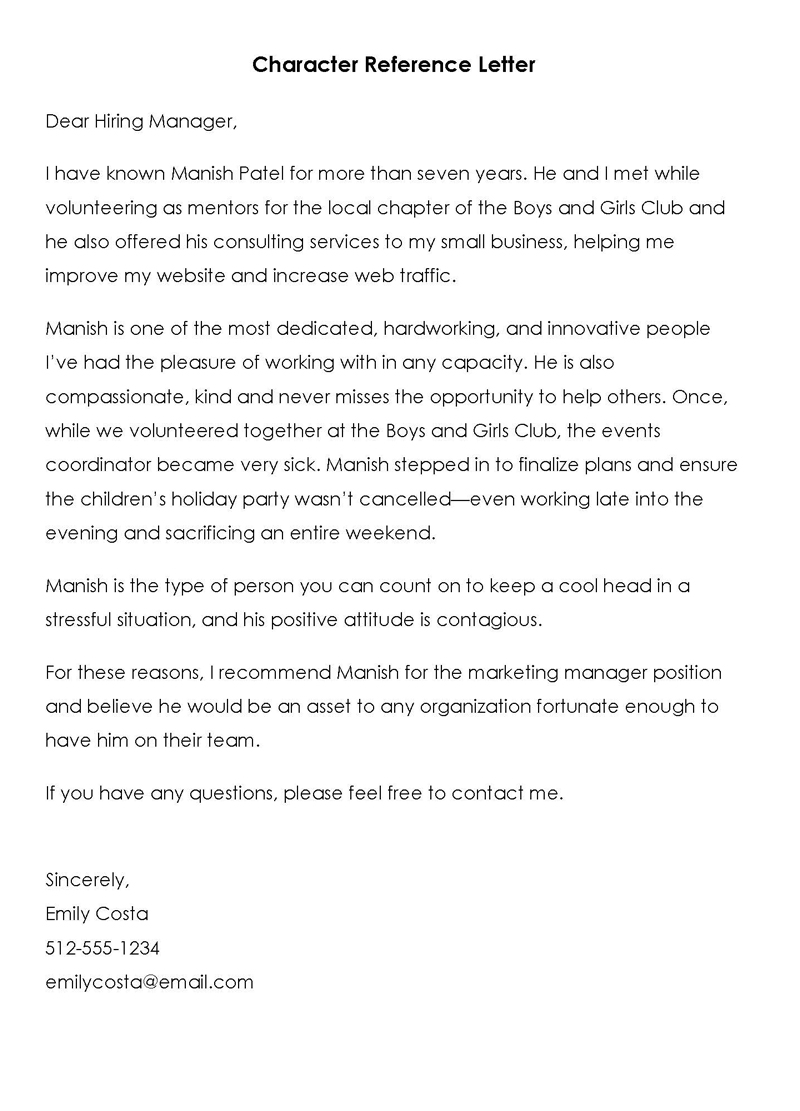
Frequently Asked Questions
Anytime the job application requires a character reference letter. The letter might be a requirement in some instances, but it can be submitted to strengthen an application in other cases.
A character reference letter, or personal reference letter, is an application letter submitted on behalf of an applicant by someone who knows them personally to vouch for them by highlighting their positive attributes and demonstrating how they can be helpful if they are awarded the position.
Character references should be issued by people who know you personally and can give insight into who you are as a person. This person can be a colleague, mentor, friend, family member, teacher, etc.
A personal reference letter should state the recommender’s relationship and the applicant, the positive qualities and traits of the applicant, examples of instances when the applicant used the mentioned qualities, and a declaration that the applicant is suitable for the job. It should also clarify who is being recommended.












